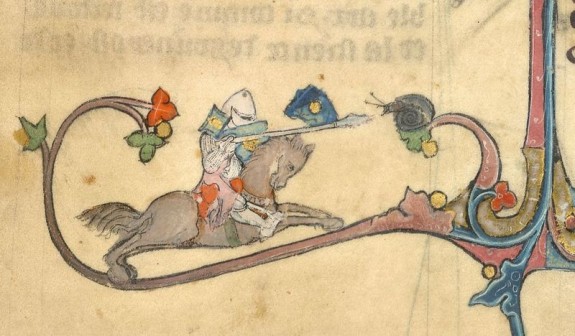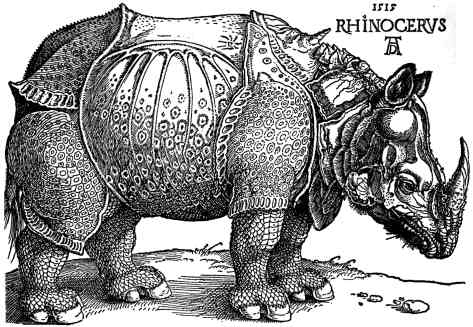CIVILIZATION
IN THE WEST:
BOOKS, BEASTS, AND BEING HUMAN
First-Year Experience/
History 105
Blocks 1-2
2014-15
a two-block course fulfilling
the Critical Perspectives:
West in Time requirement
and the entry levels of the
History, History-Political Science, History-Philosophy, and Classics-History-Politics majors
and of the History and Book minors
|
|

from from a fourteenth-century British Library manuscript--a knight battling a snail

from theearly sixteenth century, Albrecht Duerer's engraving of a rhinoceros
|
|
|
|
Instructor:
Carol Neel, Professor of History, Palmer 233
Phone 389-6527, e-mail cneel@coloradocollege.edu
Office hours 8:45-9:30 daily
Student mentor:
Caitlyn McCarty, History major
Phone 301-602-0701, e-mail Caitlyn.McCarty@coloradocollege.edu
Course description and requirements
During
these two blocks, students will consider how humankind's
relationship with the natural world has for millenia been mediated by books. In so doing, they will begin thoughtful
encounter with classical Mediterranean, medieval European, and modern
global civilizations. Course participants will ask how peoples' and
cultures' relationship with the cosmos, the landscape, and with other
living things has informed their social relations, political order, and
ideational constructs. Classroom
discussion will address primary texts and images, works by people of
the past, in cultural context.
Secondary readings will introduce students to
critical perspectives on the relationship between the past and present
of perspectives on the natural worlds. Throughout, students will be challenged to develop mutually supportive skills in reading, conversation, research, and writing.
During
Block 1, students will each complete one two-page response paper and one
six- to eight- page critical essay as well as a group study for
oral/written presentation and an oral group final based on individually prepared essays. During Block 2, course participants will craft eight- to ten-page individual research papers improved by group critique and a take-home essay exam on teh material of both blocks. All written assignments will address questions framed collectively and discussed in detail by the entire group. Class discussion
will be an important element throughout both blocks, and students excused from class for illness or other
prearranged circumstances will prepare two-page summaries of the
readings assigned for those sessions. Assessment will be based one
half on
discussion contribution/collaborative projects and one half on
individual written submissions. Papers will be turned in as
hard copies to the instructor's "in" box in the History suite by the
stated deadlines. Research essays will cite courses according The Chicago Manual of Style. All work must be prepared
according and in written acknowledgement of the Colorado College Honor Code.
Class activities will include forays into Tutt Library's Special Collections, the Press at Colorado College, and the Cheyenne Mountain Zoo.
Course materials
The
following books, listed here in order of their appearance in the
syllabus, are available for purchase in the Colorado College
Bookstore. Some of the texts represented in these editions are
available in other translations, but it will be helpful if class
members use the same translations so that we can refer to specific
pages and passages during our discussions. If students avail
themselves of discounted prices from internet merchants, they should be
careful to find the editions listed:
- Bill Bryson, A Walk in the Woods: Rediscovering America on the Appalachian Trail, 2nd ed. (New York: Anchor, 2006). ISBN-10: 0307279464
- Gilgamesh, trans. David Ferry (New York: Farrar, Strauss, 1993). ISBN-10: 0374523835
- Pliny the Elder, Natural History: A Selection, trans. John F. Healey (New York: Penguin, 1991). ISBN-10 0140444130
- Boethius, Consolation of Philosophy, trans. Douglas C. Langston (New York: Norton, 2009). ISBN-10: 0393930718
- Book of Beasts: Being a Translation from a Latin Bestiary of the Twelfth Century, trans. Terence Hanbury White (New York: Dover, 2010). ISBN-10: 0486246094
- Ugolino di Monte Santa Maria, The Little Flowers of St. Francis of Assisi, trans. W. Heywood (New York: Vintage, 1998). ISBN-10: 037570020X
- Stephen Greenblatt, The Swerve: How the World Became Modern (ISBN-10: 0393343405
- John Man, The Gutenberg Revolution: How Printing Changed the Course of History (London: Transworld, 2009). ISBN-10: 0553819663
- Johannes Kepler, The Six-Cornered Snowflake, trans. Jacques Bromberg (Philadelphia: Paul Dry, 2010). ISBN-10: 1589880536
- Voltaire, Candide, trans. John Butt (New York: Penguin, 1950). ISBN-10: 0140440046
- Michael Allin, Zarafa: A Giraffe's True Story, from Deep in Africa to the Heart of Paris (New York: Delta, 1998). ISBN-10: 0385334117
- Charles Darwin, The Origin of Species: 150th Anniversary Edition (New York: Signet, 2003). ISBN-10: 0451529065
- Sigmund Freud, Civilization and Its Discontents, trans. James Strachey (New York: Norton, 2010). ISBN-10: 0393304515
The following further works and excerpts will be available on the course’s PROWL website:
- Francesco Petrarca, "The Ascent of Mont Ventoux," in Renaissance Philosophy of Man, ed. and trans. Ernst Cassirer et al. (Chicago and London: U of Chicago P, 1948), 36-48.
- Adrian Johns, "The Book of Nature and the Nature of the Book," in Book History Reader, ed. David Finkelstein and Alistair McCleery (London and New York: Routledge, 2002), 59-76.
The following website will be a resource for group research:
Aberdeen Bestiary (http://www.abdn.ac.uk/bestiary/)
The following films will be subjects for common discussion; copies for review will be available from the instructor:
Michael Apted, dir., Nell (2004).
Tom Moore and Norah Twomey, dirs., The Secret of Kells (2009).
Jean-Jacques Annaud, dir., The Name of the Rose (1986).
François Truffaut, dir., The Wild Child (1970).
Jon Amiel, dir., Creation (2009).
Schedule of readings, meetings, written work and presentations
Discussion
session will regularly be at 9:30 in Palmer 225, unless otherwise
noted. Special scheduling is as noted below in bold face and deadlines for written assignments in bolded italics..
BLOCK 3
Week 1 (September 1)--History, nature, and natural history
| Monday
Introduction 10:30 am
Second 1:00 pm meeting
|
THINKING ABOUT NATURE AND CIVILIZATION
Afternoon screening: Nell
|
|
Tuesday
|
ENVISIONING NATURE AT THE MILLENIUM
|
Reading: Bryson 3-206
|
Wednesday
|
YOU, NELL, AND BILL BRYSON
|
Reading:Bryson 207-394
|
Thursday
|
LEAVING THE WOODS FOR THE WALLS
Two-page response paper due 2:00 pm
|
Reading:Gilgamesh
|
Friday
|
THE ROMANS AND THE BEASTS OUTSIDE THE CITY
|
Reading: Pliny 3-73
|
Week 2 (September 8)--Ancient knwoledge and a living cosmos
Monday |
EMPIRE, MORAL CHARACTER, AND HUMAN NATURE |
Reading: Pliny 74-127 |
Tuesday |
THE STRUCTURE OF THE UNIVERSE IN LATE ANTIQUITY |
Reading: Boethius 3-57 |
Wednesday |
PROVIDENCE AND FATE |
Reading: Boethius 58-93 |
Thursday
1 pm meeting |
Individual morning meetings with instructor
Afternoon Press orientation with printer Aaron Cohick (Taylor Hall) |
Development of individual critcial essay topics |
Friday |
Screening: The Secret of Kells |
Reading: Aberdeen Bestiary |
Week 3 (September 15)--The Christian world view
Monday
|
HUMANKIND IN CREATION
|
Reading: Ugolino 1-42
|
Tuesday
Second 1 pm meeting
|
ECOLOGY AND SANCTITY
Afernoon screening: The Name of the Rose
|
Reading: Ugolino 47-83, 117-118
|
Wednesday
|
Special Collections orientation with librarian Jessy Randall (Special Collections, Tutt Library)
|
Group project workshops
|
Thursday
|
Bestiary project presentations
|
Development of group bestiary papers
|
Friday
|
THE RENAISSANCE OUTDOORS
Group bestiary papers due in class
|
Reading: Petrarch, Greenblatt 14-134
|
Week 4 (September 22)--The return to ancient paradigms
Monday
|
HISTORY, NATURE, AND ACCIDENT
Six- to eight-page individual critical essays due in class
|
Reading: Greenblatt 135-266
|
Tuesday
|
Review discussion
|
Oral final study groups
|
| Wednesday |
Group take-home/oral exams |
|
BLOCK 4
Week 1 (September 30)--Scientific Revolution and Being in Nature
| Monday |
THE SMALLEST THINGS
AND THE MUSIC OF THE SPHERES |
Reading: Kepler (entire English text), reprise of Greenblatt |
Tuesday
Second 1 pm meeting |
PRINTING AND EUROPEAN SOCIETY
Afternoon Writing Center orientation/discussion with WC Director Trancy Santa (TLC 3, Tutt Library |
Man 21-140 |
| Wednesday |
PRINTING AND THE COMMUNITY OF KNOWLEDGE |
Man 141-281 |
Thursday |
PRINTED BOOKS AND THE BOOK OF NATURE |
Reading: Johns |
| Friday |
SEEKING A NEWER WORLD |
Reading: Voltaire 19-72 |
Week 2 (October 6)--Reception of a Newer World
Monday
Second 1 pm meeting |
OLD AND NEW IN CONTRAST
Afternoon research skills session with librarian Mimi Wheatwind (TLC 2, Tutt Library) |
Reading: Voltaire 73-144 |
Tuesday |
Morning screening: Wild Child |
Reading: Allin 1-112
Choice of research paper topics |
Wednesday
|
CONQUEST AND ENLIGHTENED EUROPE
|
Reading: Allin 113-198
|
Thursday
No class meeting |
Individual meetings with instructor
Research paper prospectus due 2:00 pm |
Development of research paper topics |
| Friday |
NATURAL FITNESS |
Reading: Darwin 3-7, 60-127 |
Week 3 (October 13)--Animals and mankind
Monday
Second 1:15 pm meeting |
Individual research presentations/
Pecha kucha
Afternoon Press workshop (Taylor Hall)
|
Research presentation preparation
|
Tuesday
Class starting 8:30 am
|
EVOLUTION AND THE SWERVE
Screening: Creation
|
Reading: Darwin 430-507
|
Wednesday
No class meeting
|
Morning research paper workshops
|
Peer criticism of paper drafts
|
Thursday
|
Zoo field trip
|
Readings: Group zoo history materials
|
Friday
|
NATURE IN CAPTIVITY
Zoo history presentations |
Preparation of group zoo history discussions |
Week 4 (October 20)--Mankind as animals
Monday
|
NATURE, HUMAN NATURE, AND THE TWENTIETH CENTURY
|
Reading: Freud (entire text)
|
Tuesday
Breakfast 9:30 am 2404 Constellation
|
Review discussion
Final versions of research papers due in class
|
Individual review and completion of research paper drafts
|
Wednesday
|
Take-home exam due noon |
Exam completion |
ELECTRONIC RESOURCES
This
course's research tools sessions will introduce students to many
web-based collections useful for the preparation of assignments and
further exploration. It will also urge critical techniques for
the assessment of WWW sites. The following solid websites are a
beginning to useful web research:
for Mediterranean antiquity--Perseus, at Tufts
for the European Middle Ages--the Labyrinth, at Georgetown
for an individual bestiary--the Aberdeen Bestiary
for the modern world--the Modern History Sourcebook, at Fordham
.

